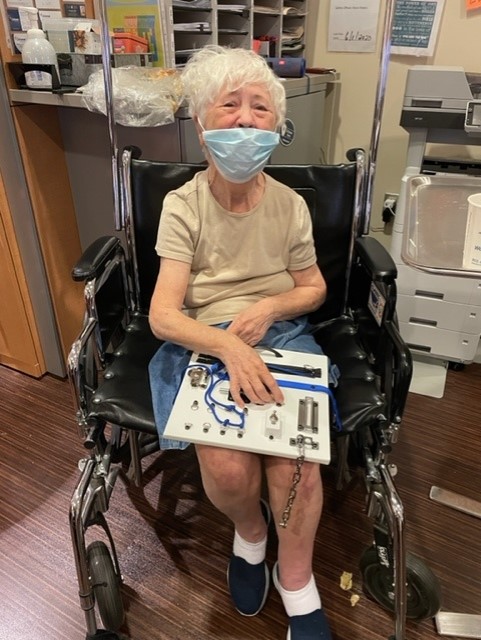Our Impact: Dr. Scott Wilks & LA-GWEP
During Social Work Month, we are sharing the impact that LSU School of Social Work has on our community and reminding you to join us for our Back with Impact event on April 26.

This patient is using a dementia engagement kit which is a box of items used to assist persons with dementia in remaining calm and stimulated during their visits to primary care clinics.
Dr. Kathy Jo Carstarphen
This week, we are featuring the work of Professor Scott Wilks and his team at the Louisiana Geriatric Workforce Enhancement Program (LA-GWEP).
Dr. Scott Wilks is the Program Director for LA-GWEP and the Director of the LSU Healthy
Aging Research Center. LA-GWEP is a five-year, $3.73 million initiative. As a partnership
between Ochsner Health New Orleans, Chamberlain College of Nursing, Alzheimer’s Services
of the Capital Area, and LSU School of Social Work, LA-GWEP impacts residents across
South Louisiana and beyond.
The mission of LA-GWEP is to improve health and wellbeing of Louisiana residents living
with Alzheimer’s Disease and Related Disorders (ADRD) and their caregivers; and improve
dementia-friendly practice in Louisiana primary care settings by educating health
professionals in medicine, nursing, and social work. Alzheimer's is the fifth leading
cause of death in the nation and is underdiagnosed. Dr. Wilks and his team are determined
to share information about ADRD to help families experience fewer incorrect diagnoses,
resulting in faster, better treatment plans.
Through the partnership with LA-GWEP, Ochsner Health has been nationally recognized
as an Age-Friendly Health System by the Institute for Healthcare Improvement. Medical
students working with Ochsner are now required to participate in dementia care training.
They are one of the first programs in the country to mandate this kind of training
for medical students. Their students have also been trained to work with caregivers
via telehealth so that patients and caregivers can have easier access to care from
trained providers. Nursing students at Chamberlain University also have a similar
dementia training requirement.
LA-GWEP also improves care for patients by training providers on dementia-friendly
practices. Speakers have included providers, diagnosed patients, and caregivers. These
seminars improve caregivers’ chances of keeping the diagnosed person in the home longer
and delaying institutionalization.
Another way that Wilks and his team are improving ADRD care is by offering resources
in doctor’s offices. They provide dementia engagement kits in patient waiting rooms.
These kits contain physical activities for patients to help diminish anxiety and keep
them meaningfully busy while they wait for their appointments. They also provide small
reference cards for healthcare providers to keep in their pockets so that they have
easy access to reminders about assessment and diagnosis of ADRD.
Wilks also took a moment to praise caregivers. “I never knew how strong they truly
were until I got into the research,” he said. “They are the angels of this Earth.”
He explained that ADRD caregivers together take on work equivalent to $300 billion
annually that families would be forced to spend if they had to seek care elsewhere.
“Anything we can do to highlight the heroic activities these folks engage in everyday
and to find some ways to ease their burden, we’ll do.”

Dr. Scott Wilks, LSU School of Social Work Professor
Fellow, The Gerontological Society of America
John A. Hartford Foundation Faculty Scholar in Geriatric Social Work
Dr. Wilks’ plans include remaining steadfast in his commitment to older adult health
and wellbeing to train the next generation of ADRD caregivers and healthcare providers.
He has recently submitted the proposal for the second five-year term for LA-GWEP funding.
The biggest change for the second grant cycle would be to expand offerings across
Mississippi.
Dr. Wilks offered thanks to his team and to everyone involved in this project. It
has “enormous scope with so many moving parts and all the team members are so incredibly
giving of their time and expertise” and he is “grateful to be along for ride.”
LSU School of Social Work is proud to share the work of Dr. Wilks’ and his team at
LA-GWEP as they improve the lives of patients diagnosed with dementia, their caregivers,
and their families across South Louisiana.
For more information on LA-GWEP: https://la-gwep.com/